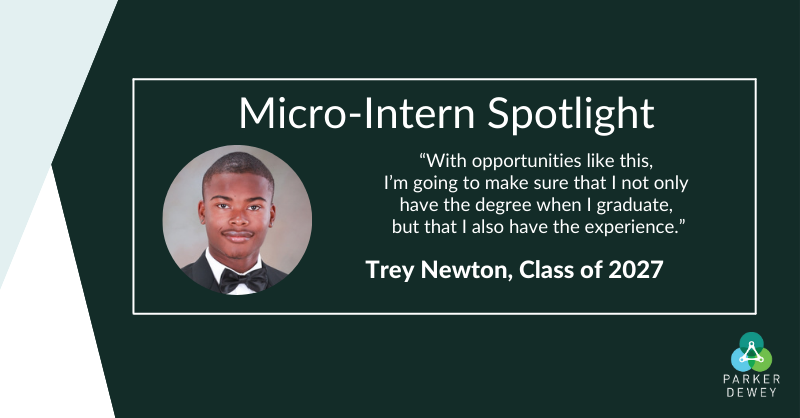.png)
Why Early-Career Recruiting Matters in the Talent Shortage
Every company has those roles that just don't seem to attract the right early-career talent—or any applicants at all. (And given the rapidly-changing COVID situation and some of the early indications around campus recruiting this fall, we’ll be revisiting our NACE presentation with Trane Technologies on this topic later this week. More on that in a moment!)
This challenge isn’t just facing certain types of companies—everyone is feeling it. Whether it’s a soda brand that students love to drink, but aren’t thinking about it for jobs. Or the manufacturing firm that spends billions on innovation, but students have never heard of it or think they have to work at a start-up to do anything “interesting.” Or the company trying to improve diversity, but isn’t seeing the impact it expects.
It’s no-brainer to pin this challenge on the labor shortage that seems to be making headlines every week, right? (We even mentioned it here last Tuesday.) We’re hearing again and again that there simply aren’t enough people to fill open roles.
But as Ludmila Praslova asserts in this week’s first featured article from ERE, the “talent shortage” issue is not really just about a lack of talent. It’s about exclusive selection systems, a lack of long-term pipeline strategies, and inadequate resources to support talent development and growth—barriers that have more to do with reaching and recognizing potential candidates than anything else.
As we’ve heard from students, removal of these barriers alone isn’t always reason enough for early talent to apply to these hard-to-fill roles. A virtual career fair, job description, or employer website still leaves early talent with preconceived notions like:
- “I thought the company only did X.”
- “My major and interests don’t relate to the role or company.”
- “I’ve never even heard of that job title before.”
- “The location and salary aren’t a fit for me.”
- “I don’t see myself thriving there, based on my knowledge of company culture.”
- “It sounds boring.”
While it may have been easier to get in front of students in the pre-pandemic world, campus recruiting has relied on the same worn-out strategies for far too long—leading companies to overlook quality talent and wind up with open roles that just won’t fill.
And that’s where experiential recruiting comes in. Tools like Micro-Internships allow companies to authentically engage candidates and outline why a hard-to-fill opportunity is actually an exciting, valuable one for early-career talent. We’ll be discussing the topic further in tomorrow’s webinar with Trane Technology’s Strategic Recruiting Consultant, Shannon Wade. Scroll down for details, and be sure to check out the article from ERE.
Jeffrey Moss, Founder and CEO
Upcoming Webinars
What Can Recruiters Do About Hard-To-Fill Early-Career Positions?
Wednesday, August 11 | 3 PM EDT
Tomorrow, join Shannon Wade, Strategic Recruiting Consultant at Trane Technologies, and Parker Dewey's Founder and CEO, Jeffrey Moss, as they discuss how incorporating more experiential recruiting opportunities allows hiring managers and recruiters to authentically engage and assess talent for hard-to-fill roles.
Save your seat here!
Want to Hire a College Student? We'll Pay!
Thursday, August 12 | 1 PM EDT
Let HubSpot Academy match you with an enthusiastic student that can do work on a small business project within your organization, providing you with immediate support and early access to diverse, high-caliber college students who could be your next great hire. The best part? HubSpot's paying. Join HubSpot Academy and Parker Dewey Founder and CEO Jeffrey Moss this Thursday to learn more about how your business can benefit.
Articles of the Week
The Talent Shortage Problem is a Diversity Problem - ERE
Challenges, Solutions for College Recruiting at HBCUs - NACE
Writing Well Is an Even More Essential Skill in a World of Remote Work - Inc.
The Talent Shortage Problem is a Diversity Problem - ERE
“Too often, individuals from underrepresented groups face underemployment because the least job-related elements of the selection process (e.g., discussions of personal interests in unstructured interviews, small talk) favor the most privileged. Inclusive organizations must align all talent-related decisions with core job requirements based on job analysis — not additional, arbitrary criteria at best marginally related to the job.”
We’re hearing again and again about the “talent shortage” affecting every corner of the workforce—but what’s the root cause? And is it a symptom of a larger issue? This article discusses why the labor shortage is more about how we identify talent and how companies should think about their “inclusive recruiting” strategies. (Pssst...we’ll be discussing the so-called talent shortage and more in tomorrow’s webinar on hard-to-fill roles!)
Related reading: Reinventing University Recruiting: (Kinda) Post COVID-19
Challenges, Solutions for College Recruiting at HBCUs - NACE
“‘Employers should be authentic with their approach, demonstrating real initiatives that their organization is committing to both internally and externally. It is important for organizations to highlight how their company is taking action and that their commitment to diversity, equity, and inclusion is genuine.’”
In light of Howard University’s Micro-Internship Program’s recent launch, we’re revisiting this NACE piece from a few months back. While there are more than 100 HBCUs across the country, companies have historically focused on a select few—and in the process, have filtered out qualified, talented candidates from their recruiting pools. And at Parker Dewey, our partnerships with 400+ colleges and organizations like UNCF can help recruiters connect and work with students from HBCUs nationwide.
Related reading: Howard University’s Micro-Internship Program
Writing Well Is an Even More Essential Skill in a World of Remote Work - Inc.
“By taking the time to carefully form your words, you demonstrate you value the recipient's time and feelings enough to avoid misunderstandings, vagueness, and brusque language.”
The ability to write well has always been a critical, yet “undersung,” skill. Clear, concise writing is even more crucial today as remote workers navigate fully-digital communication—especially for those who are new to the workforce and have limited face-to-face interaction with coworkers and managers. Strong writing is also intrinsic to any liberal arts curriculum—and that’s one of the reasons why Parker Dewey stands behind the power of liberal arts!
Related reading: Why “Soft” Skills are “Core” Skills
For more stories and insights on HR, recruiting, and diversity, click here to subscribe to our weekly newsletter Hire Learnings.


/HL%20Social%20Campaign/520%20HL%20Blog%20Post.png)

